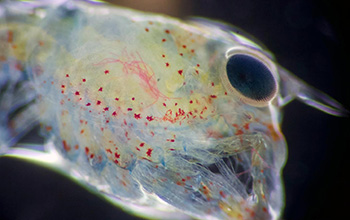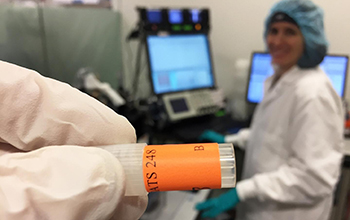搜索结果: 1-15 共查到“海洋生物学 study”相关记录42条 . 查询时间(0.21 秒)

Microplastic pollution harms lobster larvae, study finds(图)
Microplastic pollution harms lobster larvae
2020/10/10
Microplastic fiber pollution in the ocean affects larval lobsters at each stage of their development, according to new research. A U.S. National Science Foundation-funded study published in the&#...

Study analyzing cells' blueprints reveals new patterns in the global distribution and diversity of ocean microbes(图)
Study analyzing cells blueprints reveals new patterns global distribution diversity ocean microbes
2019/12/27
A single drop of seawater can contain a wide representation of ocean microbes from around the world -- revealing new insights into the ecology, evolution and biotechnology potential of the global micr...

Advanced molecular techniques have revealed the diversity of a little-known group of ocean microbes, according to a publication in Scientific Reports. Scientists analyzed samples of the microbes, call...
Stony Corals More Resistant to Climate Change Than Thought,Rutgers Study Finds
Stony Corals More Resistant Climate Change Thought Rutgers
2017/7/21
Stony corals may be more resilient to ocean acidification than once thought, according to a Rutgers University study that shows they rely on proteins to help create their rock-hard skeletons.“The...
Study Finds Bacteria Living in Marine Sponge Produce Toxic Flame Retardant-Like Compounds
Bacteria Living Marine Sponge Produce Toxic Flame Retardant-Like Compounds
2017/7/20
A Scripps Institution of Oceanography at the University of California San Diego-led research team discovered for the first time that a common marine sponge hosts bacteria that specialize in the produc...
Corals much older than previously thought,study finds
Corals much older previously thought
2016/12/13
Coral genotypes can survive for thousands of years, possibly making them the longest-lived animals in the world, according to researchers at Penn State, the National Marine Fisheries Service and Dial ...
UM Researchers Study Vast Carbon Residue of Ocean Life
UM Researchers Vast Carbon Residue Ocean Life
2016/11/4
The oceans hold a vast reservoir—700 billion tons—of carbon, dissolved in seawater as organic matter, often surviving for thousands of years after being produced by ocean life. Yet, little is known ab...
As they grow, corals are bathed in a sea of marine microbes, such as bacteria, algae, and viruses. While these extremely abundant and tiny microorganisms influence coral communities in a variety of wa...
Polluted Dust Can Impact Ocean Life Thousands of Miles Away,study says
Polluted Dust Ocean Life Thousands Miles Away
2016/5/19
As climatologists closely monitor the impact of human activity on the world’s oceans, researchers at the Georgia Institute of Technology have found yet another worrying trend impacting the health of t...
UGA study finds Saharan dust affects marine bacteria,potential pathogen Vibrio
UGA study Saharan dust marine bacteria pathogen Vibrio
2016/5/19
Iron, a critical element for living organisms, can be hard to hard to come by in open marine waters-except each summer, when atmospherically transported dust from north Africa's Sahara Desert provides...
Study Shows North Atlantic Ocean CO2 Storage Doubled Over Last Decade
carbon dioxide ocean life fossil fuels
2016/2/23
A University of Miami (UM) Rosenstiel School of Marine and Atmospheric Science-led study shows that the North Atlantic absorbed 100 percent more man-made carbon dioxide over the last decade, compared ...
Study Shows Large Variability in Abundance of Viruses that Infect Ocean Microorganisms
Large Variability Viruses Infect Ocean Microorganisms
2016/2/22
Collecting and re-examining more than 5,600 estimates of ocean microbial cell and virus populations recorded over the past 25 years, researchers have found that viral populations vary dramatically fro...
West Coast study emphasizes challenges faced by marine organisms exposed to global change
West Coast study marine organisms global change
2016/1/17
The Pacific Ocean along the West Coast serves as a model for how other areas of the ocean could respond in coming decades as the climate warms and emission of greenhouse gases like carbon dioxide incr...
Sixty Years of Sverdrup:A Retrospective of Progress in the Study of Phytoplankton Blooms
Sixty Years of Sverdrup Phytoplankton Blooms
2015/7/17
One of the most dramatic large-scale features in the ocean is the seasonal greening of the North Atlantic in spring and summer due to the accumulation of phytoplankton biomass in the surface layer. In...
Humans concerned about climate change are working to find ways of capturing excess carbon dioxide (CO2) from the atmosphere and sequestering it in the Earth. But Nature has its own methods for the rem...

